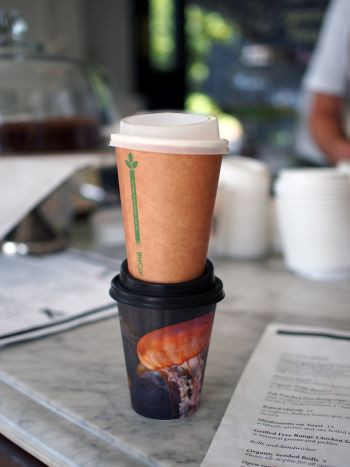
3 Ways to Reduce Coffee Cups to Landfill - Part II
29th Jul 2020
More and more people are using keep cups, but about 1 billion disposable coffee cups are still sent to landfill annually in Australia. Recently, reducing this number has been even more difficult, as many cafes refused reusable cups at the height of the pandemic. However, as we come out the other side of COVID-19 (we hope), here are three things customers, cafes, and policymakers can do to reduce the amount of waste we use.
Customers: Show Off Your Reusable Cup
If you bring your reusable cup, you might inspire others to do the same. A study found that people mimic each other in their behaviour. Watching people bring in their reusable cups to a cafe prompts others to do the same. The best bit is that you don't even have to nudge and preach to others about the environmental benefits – they will understand without you losing a friendship over it!
Cafes: Charge Extra, Don't Discount
You might make a bigger difference by charging extra for a disposable cup instead of discounting for reusable cups. Commonly, cafes offer discounts for bringing a reusable cup. However, these have been found to not be very effectual. Behavioural psychology suggests that customers are more likely to be 'loss adverse' than 'gain seekers' – they hate paying extra for disposable cups more than they like getting a discount for reusable cups. In other words, cafes are more likely to see a difference if they charge extra for customers not bringing their own cup.
Policymakers: Provide Disposal Options for Compostable Cups
To allow wider use of compostable coffee cups, we need better facilities to dispose of them. We know that not everyone is going to bring a reusable cup. It's one more thing to remember when you're rushing out of the house in the morning, and sometimes your handbag just isn't big enough. This is where compostable cups (and us) come in. Compostable cups, despite all best intentions, can still end up in landfill because users aren't aware of how best to dispose of them. In addition, most cities don't have enough organics bins to allow widespread composting. Councils and waste management companies need to introduce organics bins as part of the general street waste infrastructure. BioPak has already partnered with a waste management company in Canberra to implement city-wide composting – it's time to do the same in the rest of the country.
Information taken from The Conversation. Read about the history of plastic and why we love PLA bioplastics, on our blog.
Planet Friendly Packaging acknowledges the traditional custodians of the land on which we work. Our thoughts go out to everyone affected by COVID-19. Stay safe.
